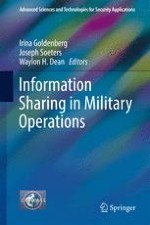2017 | OriginalPaper | Buchkapitel
6. Trust and Information Sharing in Multinational–Multiagency Teams
verfasst von : Ritu Gill, Megan M. Thompson
Erschienen in: Information Sharing in Military Operations
Aktivieren Sie unsere intelligente Suche, um passende Fachinhalte oder Patente zu finden.
Wählen Sie Textabschnitte aus um mit Künstlicher Intelligenz passenden Patente zu finden. powered by
Markieren Sie Textabschnitte, um KI-gestützt weitere passende Inhalte zu finden. powered by
